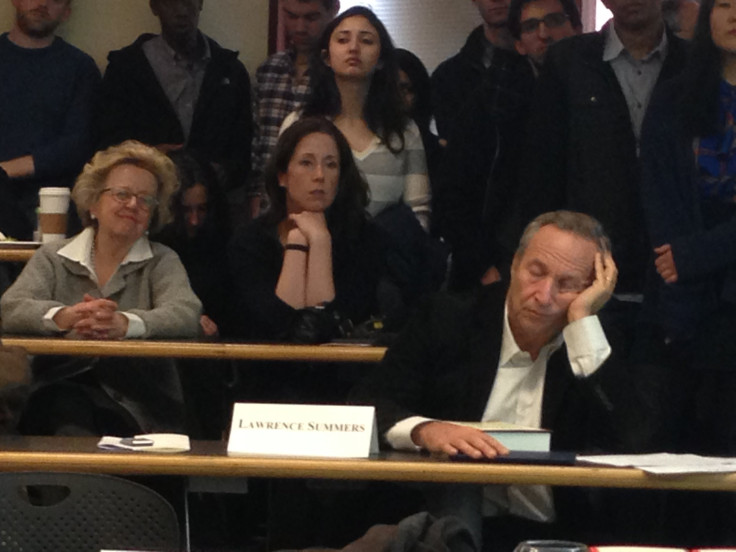For Larry Summers, Inequality A Subject Worthy of Yawns

Larry Summers bears the scars of a man who has more than once confronted accusations that he is insufficiently concerned with the plight of the less-than-affluent. Last month, Summers appeared to burnish that charge, providing evidence that income inequality is a subject that literally puts him to sleep.
At an April 18 event at Harvard’s Kennedy School of Government, Summers -- formerly President Obama's chief economic adviser -- introduced the French economist Thomas Piketty, whose new book, “Capital in the Twenty-First Century,” has provoked broad discussion about the societal consequences of income inequality. Summers introduced Piketty, mispronouncing his name to rhyme with "spaghetti," according to American Prospect editor Robert Kuttner, who was at the seminar. Then Summers sat down and appeared to nod off, according to Kuttner and other attendees, and photos that have been circulating.
One photo was posted on Twitter, and another was shared with the International Business Times. One faculty member who attended -- and who spoke on condition of anonymity, lest they damage their career prospects -- said Summers appeared to doze off for more than 15 minutes, adding that his nap did not go unnoticed by the 100-plus people in the room.
"Larry Summers, at Harvard today, following attentively Thomas Piketty's talk," read the caption on a photo posted on Twitter.
Kuttner said he was too far away from where Summers was sitting to determine how long he had dozed off.
Through a spokeswoman, Summers declined to comment, while maintaining that -- photographic evidence notwithstanding -- he remained awake during the course of Piketty's presentation.
“Larry introduced Piketty and asked two very technical questions," said the spokeswoman, Kelly Friendly. "He was very engaged, and a part of the discussion…. I don’t think it would be accurate if you said he was sleeping through the presentation.”
In fairness, a layperson might well have nodded off, too. Though Piketty's book has been acclaimed as an important contribution to the literature, it is a work of economic theory, with the terminology to prove it. Unfortunately for Summers, its argument is championed by the very sorts of people who tend to find him deficient in the area of concern for struggling people.
In essence, Piketty argues that when the rate of return on capital exceeds the pace of economic growth, inherited wealth swells while opportunities to earn money diminish. Then we get a feedback loop of diminished fortunes for ever-larger slices of the population. He asserts that widening levels of inequality undermine the very spirit of democracy.
For Summers, the symbolic import of literally closing eyes in the presence of such assertions serves to enhance his reputation as someone less than troubled by the realities of poverty.
Kuttner said the most interesting part of the seminar was a pointed exchange between Piketty and Summers, in which "Summers made the case that a lot of the inequality today is, as they say, meritocratic -- that Bill Gates earned his gazillions because's he's added all this value. And Piketty came right back at him," Kuttner said, aruging that what Gates really did was succeed in establishing a monopoly of operating systems built by thousands of uncredited engineers, and aided by antitrust authorities who allowed this monopoly to thrive.
"Granted, I am predisposed to think that Piketty would win the exchange, but I think he did," Kuttner said.
Back in the early 1990s when Summers was chief economist at the World Bank, he infamously affixed his name to a paper advocating that poorer countries should be used as repositories for the pollution-laden waste from wealthier lands.
"The economic logic behind dumping a load of toxic waste in the lowest wage country is impeccable and we should face up to that," the memo asserted. Summers later characterized those words as sarcastic retort.
As a deputy treasury secretary in the Clinton administration, Summers joined his boss, Robert Rubin, and Federal Reserve Chairman Alan Greenspan to scotch rules proposed to tamp down speculative excesses in the trade of financial instruments known as derivatives. When the financial crisis of 2008 emerged, amped up by unregulated derivatives, many blamed Summers, Rubin and Greenspan for helping engineer the worst financial disaster since the 1930s.
Summers also has the dubious honor of having the shortest tenure as Harvard president since the Civil War. Appointed president in 2001, Summers resigned in disgrace five years later amid outrage over his suggestion at an economics conference that the underrepresentation of women in science and engineering fields was due to innate differences in “aptitude” between men and women. Summers had previously clashed with Harvard’s African American Studies department head Cornel West, who left Harvard for Princeton University after Summers repeatedly criticized his performance.
Once installed in the Obama White House, Summers antagonized liberals in arguing for a smaller economic stimulus package than some of his colleagues favored in the face of the Great Recession, branding a larger package as politically untenable.
This sort of history appeared to be on the minds of those who took pleasure in the image on Twitter.
"He wasn't going to learn anything anyway," one writer, Jeb Lund, tweeted.
According to an account of Piketty's visit to Harvard in the Harvard Kennedy School review, Summers questioned him about his theory and “did not outwardly appear to be satisfied with Piketty’s answers.”
Satisfied or not, the photos suggest that Piketty's answers seemed to put Summers in a highly relaxed state.
This is not the first time Summers has been caught snoozing at a public event: In February 2009, Summers was recorded sleeping at a fiscal responsibility summit, and again in April of that year at a White House meeting with credit card industry officials.
Questions? Comments? Concerns? Tips? Email me at Ekilloran@ibtimes.com, and follow me on Twitter @EllenKilloran.
© Copyright IBTimes 2025. All rights reserved.






















